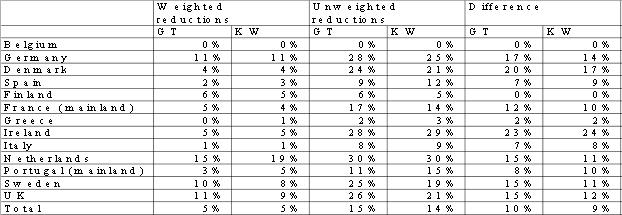|
Commission ambitions for meaningful cuts in capacity were dashed further with yet another adept 'fudge' negotiated between EU fisheries ministers that stated cutting time spent at sea - or 'activity' - could count towards the targets.
As a result of this option, taken up wholeheartedly by Germany, France, Ireland, the Netherlands, Sweden and the UK, the overall EU capacity reduction target was watered down further from 5% to less than 3%.
All six nations benefited, but the Dutch more than any. Having already seen its capacity cuts fall from 30% to around 17% with the idea of weighting reductions according to the species caught, the Netherlands suddenly found with this extra concession for days at sea its fleet had only to trim tonnage by 1% and power by 8% over the five years.
"Weekend restrictions or fortuitous reductions in activity are not sufficient for the purposes of the MAGP," the Commission concluded.
Click here to download the table shown above
*Fleet sizes as recorded by Eurostat, in its Fisheries Yearbook 2000. See also table A.
(*1) FAO landing figures, FISHSTAT database. See table C, Chapter 3, and table A, this Chapter.
(*2) The six profiles were compiled partly using data from Eurostat, but owe a lot to information contained in an exhaustive set of studies compiled in 1999 for the European Commission
(http://www.europa.eu.int/comm/fisheries/doc_et_publ/liste_publi/regions.html).
The information, however, dates from 1996/1997 but is the most recent comparative date available. It should be noted that since this date fish stocks have diminished greatly, particularly in Northern demersal species, which will have affected countries like the UK significantly. Morocco's refusal to renew a fishing access deal for EU vessels will have taken a large bite out of Spanish activity, while restrictions in 2001 on the use of fishmeal and oil in animal feed can be expected to have dented the Danish fleet somewhat.
(*3) Preparation for a mid-term review of the Multi-Annual Guidance Programmes, The European Commission, 10.5.2000, Document number COM(2000) 272.
Ends.
|
